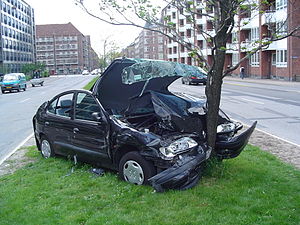 Image via WikipediaDriving and the death wish - I wonder what I was going to write down about this, all those months ago? We're talking about obvious stereotypes here. All very banal - Italians drive like maniacs etc. etc. etc. Nonetheless, it intrigues me. My Dad reckons I'm exaggerating, and he knows a thing or two about driving, but I feel significantly safer on the roads in England. We don't have a car, but I think it would take me some time before I felt at all happy driving here. Probably the crux of it is this: quite a lot of people die on Italian roads. A good many lives are wasted, and the fact that even I know this suggests that it's adequately reported. So why doesn't this translate into more cautious driving? Is it that they think they're invincible, or is it that they don't mind dying so much as we do?
Image via WikipediaDriving and the death wish - I wonder what I was going to write down about this, all those months ago? We're talking about obvious stereotypes here. All very banal - Italians drive like maniacs etc. etc. etc. Nonetheless, it intrigues me. My Dad reckons I'm exaggerating, and he knows a thing or two about driving, but I feel significantly safer on the roads in England. We don't have a car, but I think it would take me some time before I felt at all happy driving here. Probably the crux of it is this: quite a lot of people die on Italian roads. A good many lives are wasted, and the fact that even I know this suggests that it's adequately reported. So why doesn't this translate into more cautious driving? Is it that they think they're invincible, or is it that they don't mind dying so much as we do?Child safety - Very closely related is the following. I came across this (Italian) article through work. Once more unto the sterotype breach - Italians love children (there, that wasn't so bad was it?) but the article claims that "63% of Italians don't use child seats", based on 7 cities studied, "thus showing little love for their own children". The best city was Mestre, with a paltry 53% of children properly strapped in, a veritable safety paradise compared to Naples - 17%. A list of lame excuses follows: "it's only round the corner"; "the child seat's in the other car"; "it's fine - he's sat on the back seat anyway"; "he cries if I put him in the child seat", "I prefer the seat belt". It says that there's a tendency to use child safety devices in the first months, because it's more convenient, then they tend to get forgotten about. The disconnect between the depth of feeling on one hand and the actual care taken over children is, it would seem, incredibly profound.
School Textbooks - They have a different system for school textbooks over here. I guess that doesn't sound particularly earth-shattering, but in fact, it means that school textbooks are pretty much an annual news story, because the system is this: you buy them. Good news for the publishing industry, which can release a stream of different shiny new textbooks every year, bad news for parents, who have to fork out. It's a bit like for us at university, when you find, just by chance, that the course textbooks are written by your lecturer. The thing that I find strange is that they've been complaining about the system for years, but they haven't got round to doing anything about it. What naturally comes to mind is that they could copy us, and say that it's the school's responsibillity to pay for textbooks. Then we'll see if publishers can talk schools into buying a new textbook every year! I remember using a lot of dog-eared school textbooks, but somehow I still managed to get educated. In fact, I often wonder in general why governments don't copy more legislation off each other. Don't Sweden do renewable energy better than us for example? Can't we just copy some ideas off them then? I suppose politicians prefer to look original (apart from the Tories nicking the free schools idea).
Interrogation - I’m not sure what I should call this one really. In Italian it’s interrogazione, and it might not be so bad as it sounds, but it’s still pretty bad. I learnt about it when I was helping an Italian relation (my wife’s cousin’s daughter – you can’t get any closer than that) and some of her peers with their English for school. Apparently, every year, or term or something, as a test, every pupil has to stand at the front of the class and get quizzed on whatever it is that Italian schoolchildren are supposed to know. Horrible! I’m glad I didn’t go to school in Italy! I wonder what the idea is; it probably does have some positive aspects in fairness. Monica said that she observed that the English were hopeless at giving presentations at university, but I think that particular problem probably goes deeper. Anyway, the idea makes my skin crawl.
